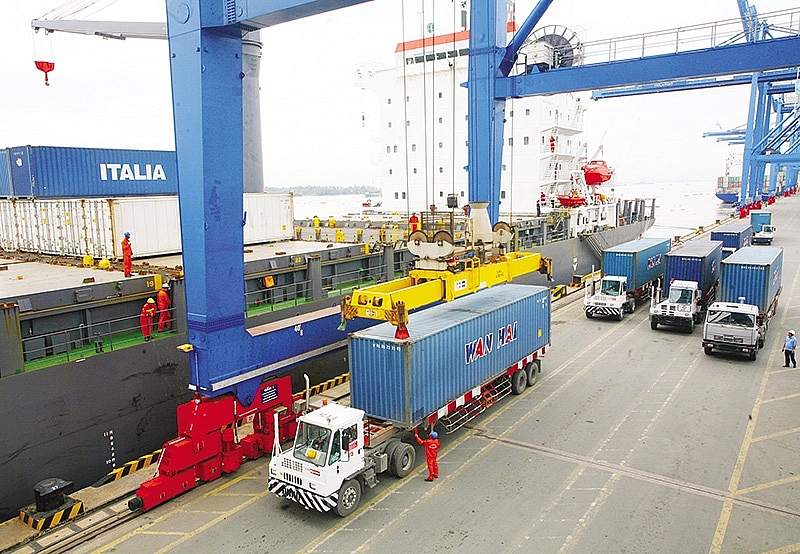Benefits for Vietnam in EU deal
 |
| The EVFTA puts Vietnam in the doorway to tremendous opportunities Photo: Le Toan |
The EU-Vietnam Free Trade Agreement (EVFTA) represents an historic change and a new chapter in trade and investment relations between Vietnam and the European Union. It is the most comprehensive and ambitious free trade agreement ever concluded between the EU and a developing nation, and one which will open up huge new opportunities for businesses and consumers on both sides.
 |
| Nicolas Audier |
The EVFTA will both boost bilateral trade and investment, and see Vietnam further integrate into the global economy and international community.
Once ratified and implemented, the EVFTA will phase out almost all tariffs between the EU and Vietnam over the course of a decade. It will remove tariffs on 65 per cent of the value of EU exports upon entry into force, with the remainder eliminated over the following 10 years. Meanwhile, 71 per cent of EU imports from Vietnam will be tariff-free from the moment the EVFTA takes effect, rising to over 99 per cent across the next seven years.
Customs duties will be eliminated almost entirely over a transitional period of seven years for Vietnamese goods and 10 years for EU goods. This represents a true win-win for business and consumers, in the form of lower prices and increased competitiveness.
The EVFTA also includes provisions on market access for services. In the deal, Vietnam has gone over and above the World Trade Organization baseline in terms of market access granted to EU service providers. Additional sectors and sub-sectors will be opened up, giving the EU the best possible access to Vietnam.
For this reason, the European Chamber of Commerce in Vietnam (EuroCham) has been a strong supporter of the EVFTA – and the accompanying Investment Protection Agreement (IPA) – since negotiations first began in 2012.
Throughout the 14 rounds of negotiations between 2012 and its conclusion in 2015, we provided input and advice to negotiators on both sides to ensure the best possible outcome for companies, citizens, investors, and society as a whole.
Since the agreement was finalised, ensuring its swift ratification and implementation has been at the heart of our activities. This is because the EVFTA will do more than reduce barriers to trade and accelerate Vietnam’s growth and development across all sectors.
It will also help to modernise Vietnam’s legal framework, strengthen the trade and investment environment, improve food safety and quality standards, and boost exports to the EU’s 500-million-strong market. This will benefit not just businesses and investors, but also the welfare, wages, and living standards of millions of people across Vietnam.
For this reason, we have led three missions to Brussels to advocate the swift ratification and implementation of the EVFTA. During our high-level meetings with EU commissioners, senior officials, members of the European Parliament (MEPs), and others, we found widespread support for the agreement and optimism about its prospects for ratification.
Since the end of 2015, our activities have focused on raising awareness of the EVFTA, sharing recommendations to overcome implementation challenges, and helping companies and authorities in Vietnam to prepare for this new trade and investment environment.
Now, after legal scrubbing and translation into Vietnamese and 22 official languages of the European Union, the EVFTA is in the final stages of ratification. Following the European Commission’s adoption of the EVFTA in October 2018, last week we were delighted to learn that the EU’s Council of Ministers – made up of the heads of state of all 28 EU member states – approved the official signature of the deal.
The EU’s Trade Commissioner, Cecilia Malmström, along with the Romanian Minister for Business, Trade and Entrepreneurship Ștefan-Radu Oprea last week visited Hanoi where the agreement was signed. This is the penultimate step in the ratification process, with just a crucial vote to follow in the EP later in the year.
Once it is implemented, the EVFTA will build upon a decade of growing trade and investment between the EU and Vietnam. Figures from the Vietnamese Ministry of Planning and Investment show that as of June 20, 2019, European companies had about 3,400 investment projects registered at more than $54.8 billion in Vietnam. This amounted to 11.8 per cent of total foreign-invested projects and 15.57 per cent of foreign direct investment.
Once it enters into force, the EVFTA and its IPA will see these figures rise further. These agreements will provide a more secure, predictable, and business-friendly environment, and one which is better aligned with international norms and practices. In short, the EVFTA will open markets, increase trade, and make Vietnam a more attractive investment destination for European companies in Southeast Asia. Vietnam will become a trade and investment hub in the region, well-placed to attract new investment from companies looking to benefit from the new opportunities.
In October last year, we asked our 1,000 members how the EVFTA would affect their trade and investment plans in Vietnam. Their responses painted a strong, positive, and optimistic picture. Most said that the EVFTA would have either a “significant” or “moderate” impact on their business or investment plans in both the medium term (78 per cent) and long term (85 per cent). Furthermore, 72 per cent agreed that the EVFTA will help Vietnam become a hub for European companies in the ASEAN.
Our members believe that it will positively impact a range of social and environmental issues, from welfare (88 per cent) and environmental protection (85 per cent) to knowledge transfer (88 per cent) and workers’ rights (65 per cent).
Experts also agree that the EVFTA will have a positive and significant impact on Vietnam’s social and economic development Over the implementation period, the country’s economic growth will be around 7-8 per cent higher than if the EVFTA had never entered into force. Meanwhile, Vietnam’s exports to the EU will rise around 50 per cent, with high growth in imports.
On top of this, real wages for unskilled workers are estimated to rise around 3 per cent, with household incomes also set to increase, according to the European Trade Policy and Investment Support Project.
Together, the EVFTA and the IPA are a true win-win for both Europe and Vietnam. The EVFTA will further open up Vietnam to European investors, while the IPA will give those investors greater confidence and protection to grow their business operations here. This means greater access to high-quality, innovative European goods and services in Vietnam.
While the events of last week are a decisive and welcome step forward, the EVFTA’s ratification is not a foregone conclusion. The last hurdle is now the crucial vote in the EP. While the economic benefits are undisputed, MEPs continue to closely follow Vietnam’s progress on issues such as labour rights and environmental protection. The Vietnamese National Assembly’s decision earlier this month to adopt the International Labour Organization (ILO) Convention 98 on Collective Bargaining has sent a positive signal that the government is dedicated to continuing its positive record of reforms in this and other areas.
The EuroCham will continue to share this and other similar achievements in our regular, high-level engagement with the EU and its institutions.
Challenges also remain in terms of ensuring the smooth implementation of the EVFTA in Vietnam. But the EuroCham is dedicated to supporting enterprises to unlock the full potential of this agreement and take advantage of the new opportunities that it provides. We will continue to hold events to raise awareness about the EVFTA and its provisions, to ensure Vietnamese businesses, citizens, and all of society benefit from privileged access to Europe’s large and high-value consumer market.
| Bui Viet Quang, general director, Song Hong Garment JSC
I think that this is one of the most important and historic FTAs for Vietnam, because the EU is the bloc of the most advanced nations in the world, with long-lived civilisations and famous scientific and technological foundations, and with strict but equal and sustainable conditions for partners. This agreement attests to the confidence of EU nations in Vietnam’s development potential. This is also an opportunity for Vietnamese consumers to access healthy and high-quality European products at a lower cost. The EVFTA also offers opportunities for Vietnamese enterprises to compete more equally with nations that are now enjoying the “most-favoured nation” status on tariff such as Myanmar, Bangladesh, and Cambodia, and to improve their capacity in order to penetrate deeper into the EU market. Especially, to garment and textile firms, if they take advantage of materials produced within Vietnam, they can win over rivals and gain stronger growth in the EU market. The EVFTA will greatly benefit enterprises wishing to produce cloth in Vietnam. However, a tariff exemption does not mean everything, because over the past many years, big EU fashion firms like Zara, H&M, and Mango have been importing products from Myanmar, Bangladesh, and Cambodia at a cost far lower than that in Vietnam, not to mention these nations’ tariff advantages. As for Song Hong, we have begun to approach more European customers in order to capitalise on all opportunities brought about by the EVFTA. Russell Reed – Managing director, UPS Vietnam and Thailand
UPS, a global logistics provider and leading advocate for global trade, applauds the signing of the EU-Vietnam Free Trade Agreement, and we congratulate the negotiators from both sides who have worked so hard to reach this important milestone. Once ratified and entered into force, we are excited about the opportunities the agreement is expected to bring to our customers – particularly Vietnamese exporters of footwear, textiles and apparels – in finding new markets in the EU and diversifying trade lanes. At the same time, Vietnam is an attractive growth market for European businesses – with the fastest-growing middle class in the region – providing a ready market for European autos and auto parts, machinery and pharmaceuticals. We urge in the coming months for the swift ratification of the agreement on both sides so that both Vietnamese and European companies can begin to take advantage of these benefits, and upon entry into force we look forward to working with our partners in the public and private sectors to make the agreement a success. Lynette Moey - Managing director, Bayer Vietnam
Vietnam is one of the 10 members of the ASEAN and has become the EU's second-largest trading partner in the region through this free trade agreement, after Singapore. The EVFTA promises to bring Vietnam and Europe closer together. Once ratified, trade and investment will grow, bringing positive benefits for business and consumers on both sides. Vietnam has long been a favoured investment destination and European businesses have long been proud contributors to the Vietnamese economy and society. The EVFTA will enhance broad and expanding relationships in many key areas, resulting in the creation of jobs, development of expertise, and the transfer of innovative know-how, the generation of tax revenues, and the introduction of cutting-edge technology, as well as the provision of many new goods and services to benefit consumers. The agreement’s strong commitment to open, fair, and rules-based trade will widen export markets for Vietnam. The improved regulatory co-operation and coherence through this EVFTA will bring advantages to Vietnam towards international rule alignment which will not only attract foreign investors but bring advantages to the Vietnamese society to access high-quality products. Besides significant economic opportunities, the two sides have agreed on strong sustainable development measures. The EVFTA will create considerable opportunities for Vietnam’s agriculture as it will boost agricultural exports, improve the sector’s competitiveness and promote Vietnam’s international economic integration. The EU is currently the second-largest market for Vietnamese exports of key produce and commodities such as coffee, cashew nuts, and pepper. We also see the opportunity for the Vietnamese agricultural sector to access innovation and technology to enhance the prosperity of farmers through productivity incentives and contribute to economic development sustainably. For the healthcare sector in Vietnam, there are opportunities to strengthen high-quality services through innovation and infrastructure investments. Bayer, together with the healthcare industry, is ready to join hands with the government to support such developments and share international practices to improve patients’ access to better quality treatment in Vietnam. We are looking forward to further institutional and policy reforms after the EVFTA ratification: such reforms can consequently create favourable conditions to promote the business and investment environment. We will truly commit to promote Vietnam’s advantages and potentials in the agricultural and healthcare sectors. Bayer is ready to have further, close co-operation and partnership with the government and relevant stakeholders to achieve the national action plans in the respective areas and ensure the effective implementation of the EVFTA. Bruno Angelet - Ambassador of the EU to Vietnam
The EVFTA marks a milestone in the strong and fruitful relationship that the EU and Vietnam enjoyed for three decades. Bilateral trade has not only established strong and productive links between the sides, but has also created an impetus for economic development and strategic collaboration. The agreement seeks to deepen Vietnam’s economic integration, facilitate trade liberalisation, and improve the legal framework for enforcement of standards at both domestic and international levels. By taking advantage of the EU’s expertise and technological innovation, Vietnam has the opportunity to advance and diversify its economy while improving the competitiveness of domestic businesses. This presents a win-win relationship for Vietnam and the EU. The trade agreement, together with the Partnership and Co-operation Agreement that entered into force in 2016, consolidates areas of co-operation and engagement, and deepens and diversifies our relations in areas of mutual interest. Through the trade and investment agreements, we can encourage more European firms to be present in Vietnam, and promote better access for Vietnamese businesses to the European market. Doan Van Hien - Managing director, Electrification Business at ABB Vietnam
The EVFTA will give the economy a boost. It will widen the door for businesses from both sides to co-operate and create motivation and certainty for European businesses. Like many areas in life, agreements can also bring challenges. The EVFTA opens new markets, but also introduces the domestic market to increased competition. This means that businesses have to constantly search for innovative products and technologies. Businesses need excellent teams to deliver the best that new digital technology can offer, and they need to continually build employee capacity. Investment in skilled workforce coupled with application of advanced technologies will help businesses improve productivity and competitiveness, and move higher up the global value chain. With our wide business scope and established market presence, we are well-positioned to bring the economy to its next phase of growth. The move to electric mobility is a huge global trend and we will soon install electric charging stations at our two manufacturing plants to demonstrate this technology which allows remote management of charging and diagnostics. Le Van Quang - Chairman, Minh Phu Seafood Corporation
When the EVFTA takes effect, the import tariff in the EU will be reduced to zero, ushering in big opportunities for the Vietnamese shrimp industry. For example, regarding whole-cooked shrimp, EU customers often purchase whole-fresh shrimp from Vietnam and then cook them in their nations. However, because the shrimp has been frozen and then defrosted before being cooked, its head and gills turn black, reducing sales price. But because there is a 7 per cent difference in import tariff, meaning 11 per cent for cooked shrimp, and 4 per cent for fresh shrimp, EU customers still buy fresh shrimp and then cook it themselves. Thus, the EVFTA will greatly benefit Vietnamese shrimp exporters. The biggest challenge for Vietnamese shrimp is how to meet the standards of the Aquaculture Stewardship Council, an independent, international non-profit organisation that manages the world’s leading certification and labelling programme for responsible aquaculture. However, the major Vietnamese shrimp companies have already secured these standards. Minh Phu expects that its market share in the EU will grow by 50-100 per cent, from the existing 12 per cent to 15-20 per cent in the future. Pierre-Jean Malgouyres - General director, Archetype Group
Archetype Group understands better than most the potential of this market, and we have strong reasons to be even more optimistic on its future outlook after the EU-Vietnam trade and investment agreements. Beyond our firm Asian foundations, we continuously nurture our EU capabilities with multiple strategic acquisitions and alliances, which will benefit from a virtually barrier-free trade environment between the EU and Vietnam. Just last year, together with leading Belgian healthcare designer VK Group, we formed a joint venture called VKA Healthcare to target hospital design and construction opportunities in Vietnam and Asia. Earlier this year, Archetype finalised the acquisition of French engineering firm BECT, furthering our technical resources and networks in France and Europe. The EVFTA conclusion is the kind of good news Archetype Group fully welcomes, and we are well-equipped to offer turnkey consultancy services to French and other European companies wishing to pursue projects in Vietnam and Asia, as well as Asian companies looking at Europe. Marko Walde - Chief representative, German Industry and Commerce Vietnam
We support for the signing and ratification of the EVFTA, which will open big opportunities to both Vietnamese and European investors, including German ones. However, we see the challenges for Vietnamese products, in terms of intellectual property rights protection, global competitiveness, and the origins of product materials. Local companies should improve their competitive advantages as soon as possible. In a May report, Prime Minister Nguyen Xuan Phuc requested policy adjustments to speed up the development of the automobile and supporting industries by educating high-quality workforce, exchanging experiences, and digitalisation. We think these are essential for Vietnam to develop sustainably. One critical point that could constrain international investment: Vietnam intends to maximise foreign ownership in automobile joint ventures at 50 per cent, which is clearly against the spirit of free trade and closer partnership. The EVFTA will bring many opportunities to both parties and in order to accelerate the ratification, both parties should present their good will. Grant Dennis - General director, PwC Consulting Vietnam
From an operational point of view, with free trade agreements like the EVFTA coming into force, there will be more opportunities for faster electronic clearance in the trade of goods and services across borders. At the moment, the sophistication of the trade finance systems and services in Vietnam are low by regional and global standards. With this in mind, I believe that thanks to the agreements there will be a significant opportunity for banks in Vietnam to enhance those services and introduce blockchain and other leading technologies to make trade faster, and lower costs for importers and exporters. For example, banks can automate and digitise lease, credit, or trade finance. They can also introduce more sophisticated services that will be demanded by importers and exporters to reduce the trade system barriers and work with the Vietnam National Single Window electronically. The banks that can pioneer these new customer services and technologies will be the leader in Vietnam very quickly in the trade service areas and generate new services revenues which have already grown very fast, at 20-40 per cent last year. Elsbeth Akkerman - Ambassador, the Netherlands
The signing of the EVFTA is a great achievement of the Vietnamese government and the European Union, including the business community, and it is an important step in the intensification of trade and investment relations. What is important in the future is the Vietnamese government keeps working on the balance between economic growth and sustainability and remains committed to sustainable development goals, and encourage sustainable business practices. One of the best things the Vietnamese government can do to improve the business environment is to actually engaging with the business community. The government has received a lot of good advice about further improving the business climate in terms of transparency, and predictability. There are a number of laws that are very important, such as the ones on public-private partnership, investment, and tendering, and they need further engagement from businesses. Tran Duc Huy - CEO, Saint-Gobain Vietnam
As one of the largest European companies currently operating in Vietnam, Saint-Gobain understands the importance and benefits of the EVFTA for all European and Vietnamese businesses, workers, and consumers. This is a new-generation bilateral agreement, and in addition to economic, trade, and intellectual property protection agreements, the new deal also encourages respect for environmental protection and the fight against climate change under the Paris Agreement. For our Saint-Gobain Vietnam, the potential removal of tariff and technical barriers in accordance with the new agreements will open up opportunities for us to introduce our advanced performance products, and innovative and advanced technologies to serve Vietnamese customers, promote sustainable construction, and green building orientations in Vietnam. |
What the stars mean:
★ Poor ★ ★ Promising ★★★ Good ★★★★ Very good ★★★★★ Exceptional
Themes: EVFTA & EVIPA
Related Contents
Latest News
More News
- State corporations poised to drive 2026 growth (February 03, 2026 | 13:58)
- Why high-tech talent will define Vietnam’s growth (February 02, 2026 | 10:47)
- FMCG resilience amid varying storms (February 02, 2026 | 10:00)
- Customs reforms strengthen business confidence, support trade growth (February 01, 2026 | 08:20)
- Vietnam and US to launch sixth trade negotiation round (January 30, 2026 | 15:19)
- Digital publishing emerges as key growth driver in Vietnam (January 30, 2026 | 10:59)
- EVN signs key contract for Tri An hydropower expansion (January 30, 2026 | 10:57)
- Vietnam to lead trade growth in ASEAN (January 29, 2026 | 15:08)
- Carlsberg Vietnam delivers Lunar New Year support in central region (January 28, 2026 | 17:19)
- TikTok penalised $35,000 in Vietnam for consumer protection violations (January 28, 2026 | 17:15)












 Tag:
Tag:

















 Mobile Version
Mobile Version